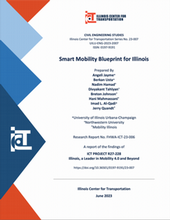Illinois, a Leader in Mobility 4.0 and Beyond
SPONSOR: Illinois Department of Transportation
BY: Illinois Center for Transportation & Northwestern University Transportation Center
PRINCIPAL INVESTIGATORS: Angeli Jayme (UIUC), Imad L. Al-Qadi (UIUC), Hani S. Mahmassani (NU), Breton Johnson (NU), Jerry Quandt (Mobility IL)
Connected, automated, shared, and electric (CASE) technologies have invoked Mobility 4.0—a connected, digitized, multimodal, and autonomous system of systems. This project established a flexible and adaptable blueprint that would streamline multidisciplinary and multi-stakeholder efforts as well as leverage available resources to prepare the Illinois Department of Transportation and other transportation agencies.
Illinois has several strengths that make it an attractive location for CASE technology companies, including a talent pool from top-ranked universities, well-developed transportation infrastructure, government support, and a robust ecosystem of collaboration and innovation. Illinois also faces potential challenges (e.g., competition from other states and countries, limited access to funding, regulatory hurdles, and infrastructure readiness for new mobility technologies).
Seven smart mobility pillars were identified in this study for Illinois—namely, connected and automated (CA) freight, scaling intelligent transportation systems, farm automation, insurance, urban mobility, CA logistics, and alternative fuels. The balanced scorecard ranked the pillars as follows (from highest): alternative fuels, scaling intelligent transportation systems, CA freight, farm automation, CA logistics, insurance, and urban mobility. Tactical focus areas were also identified per pillar and were prioritized with suggested leads and stakeholders to champion the CASE directives and opportunities. Near-term actions for Illinois were also suggested that included establishing a central structure for Illinois’ CASE program, enriching the knowledge base and experience, preparing transportation infrastructure, partnerships with external stakeholders, and expansion of laws, regulations, and policies that will help administer and grow CASE technology deployment and integration.
Back to top

